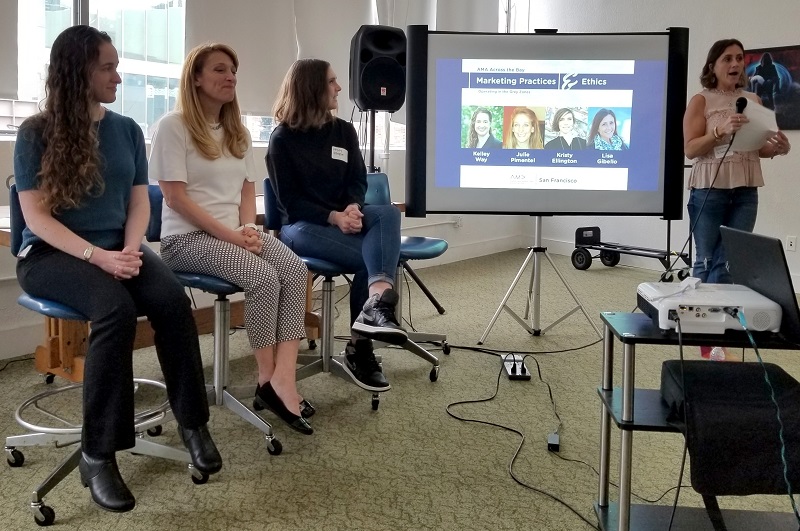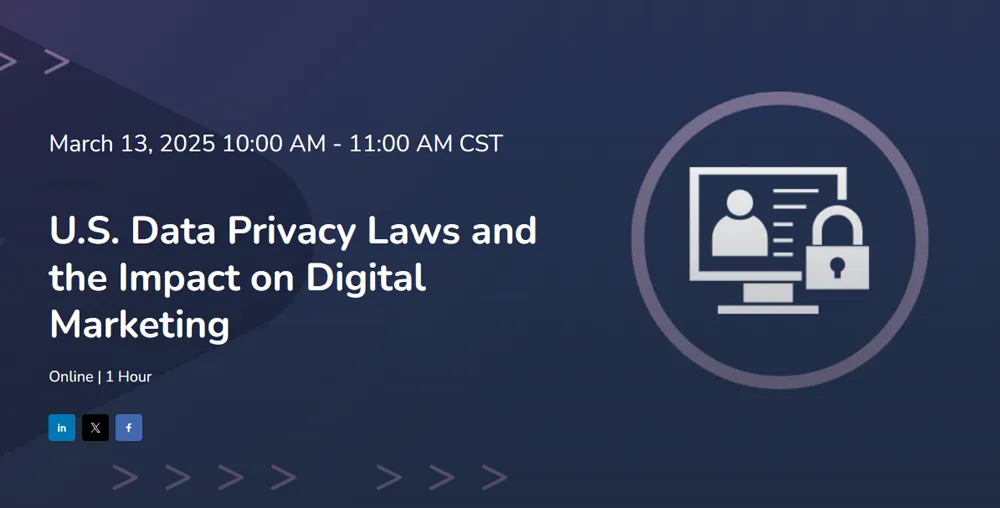At the event, Marketing Practices & Ethics: Operating in the Grey Zones, held in Oakstop’s event space in Oakland’s thriving business district, a panel of speakers shared their insights regarding privacy concerns and best practices to help steer marketers into transparency and ethical marketing practices.
Deftly moderated by Lisa Gibello, Senior Vice President of Recruiting at The Creative Group, the discussion easily progressed through the following four topics:
- GDPR & CCPA privacy concerns
- Persuasive versus deceptive advertising
- Content rights and ownership
- The use of influencers
GDPR & CCPA Privacy Concerns
The EU General Data Protection Regulation (GDPR) took effect in 2018 to regulate data privacy laws across the European Union. The GDPR regulates organizations within and outside of the EU that provide goods and services to people who reside within EU countries. For those residing in California, the California Consumer Privacy Act (CCPA) will come into effect in 2020 and promises to be the most comprehensive privacy law in the country, with similar directives as the GDPR.
While the CCPA affects large companies (those with gross revenues of more than $25 million), all marketers in California should be aware of consumer rights protected it and the GDPR, particularly those concerning how to collect personal data, how to secure it, and how to inform consumers about how they intend to use it.
Much of the evening’s discussion was centered on the practices of selling, sharing, and purchasing personal consumer data. Both the CCPA and GDPR require consumer consent for data to be sold to second and third parties. The GDPR requires active consent for the sale of data, and hiding this information behind a company’s Terms and Conditions is frowned upon.
Additionally, Kelley Way noted that the CCPA requires marketers to list exactly the ways in which data will be shared, and if after consent, the organization desires to use the data in an additional way, it must inform the consumer prior to the new use. All panelists agreed that, when in doubt, marketers should follow the stricter of the two regulations—the GDPR.
Kristy Ellington emphasized that marketers should be good citizens, guided by an ethical compass that informs their practices. When she strategizes a marketing plan she asks herself: Would I want this happening to me? How would I think about this brand if I were the consumer? As a matter of rule, she steers away from grey area practices, like the purchase of email lists.
For more about the CCPA, read the AMA blog “What Marketers Need to Know about the California Consumer Privacy Act.”
Persuasive Versus Deceptive Advertising
When does an idea that anticipates suspension of disbelief become deceit? Kelley lay bare that while the courts accept a certain amount of exaggeration in marketing tactics known as puffery, the line of culpability is drawn where the marketer attempts to convince the consumer of something that isn’t true.
Marketers run the risk of having a legal complaint on their hands should a consumer come to believe that the exaggeration was actually possible. But the damage done to an organization’s reputation can be far greater than the monetary compensation paid through a lawsuit. Building and maintaining consumer trust is integral to a brand’s success, and once that trust is broken the brand may never fully recover.
During the panel discussion, a couple of real world examples where shared where consumers won lawsuits against organizations that promoted baseless claims through their advertising tactics.
Content Rights and Ownership
Picture this: You’re building an email and are in need of the perfect hero image within a very limited budget. You scour the Internet—possibly for a lot longer than it took you to strategize and write the email itself—and finally you find the perfect photograph! But the source isn’t listed and you can’t tell if there are any usage rules. Do you use it? Perhaps you think if there’s no source information, then it shouldn’t be a problem.
In today’s digitally driven age, content, ideas and imagery are right at our fingertips, making it easier than ever to slip into less-than-optimal ethical practices. In response, The Digital Millennium Copyright Act (DMCA) of 1998, which amends the Copyright Act of 1976, enhances copyright protections of content used online.
The DMCA includes the Online Copyright Infringement Limitation (OCILLA), which provides safe harbor liability protections for online service providers (OSPs like YouTube, Etsy, Facebook, online education courses, photo sites, etc.) when infringing content is posted on their platforms without their knowledge. However, OSPs must take down the infringing content expeditiously upon notice and pay a penalty (increased by the DMCA) if they’re deemed in violation of copyright law.
It’s worth doing your homework and taking the extra steps to make sure you give credit (and payment) where and when it’s due. As Julie Pimental mentioned, there are organizations like Pixy and Grammarly that help protect the rights of artists and content creators by identifying if their work is being used without consent.
Follow this rule of thumb: When in doubt about a creative asset, veer on the side of caution and just don’t use it. And when it comes to what constitutes plagiarism of words, take note: Facts can be reworded; however, expression or a collection of ideas is copyright protected. If budget is an issue, rather than taking an ethical risk, opt for accessing any number websites that share copyrighted work for free.
The of Use Influencers
The value of influencers is a hot topic. Think of singers, movie stars, sport athletes, and, most recently, social media celebrities who are engaged in brand promotion. This tactic can be tricky and must be thought through. An influencer may have reach in that they have many followers, but those followers may not be consumers of your type of product, as such they lack quality. Additionally, a large following doesn’t equal engagement. When identifying a social media influencer for your brand who will provide a worthwhile return on your investment, Kristy recommends you consider these criteria:
- Reach: How many followers does the influencer have?
- Alignment: Is the type of content the influencer promotes aligned with your product? Does the influencer share your brand’s values?
- Demographics: Do the followers have the same or similar traits as your targeted consumers?
- Engagement: How engaged are the followers in the influencer’s content?
Lastly, influencers may lack the sophistication needed of a brand ambassador. If you contract an influencer to promote your brand, it’s your responsibility to educate them and assure they follow ethical and legal guidelines. You’ll also want them to be aligned with your brand’s standard of ethics, rules of comportment and values.
When you take these considerations into account, it’s more likely you’ll have a successful influencer experience.
The AMA’s Ethical Norms
As Marketers, we must:
1) First do no harm: This means consciously avoiding harmful actions or omissions by embodying high ethical standards and adhering to all applicable laws and regulations in the choices we make.
2) Foster trust in the marketing system: This means striving for good faith and fair dealing so as to contribute toward the efficacy of the exchange process as well as avoiding deception in product design, pricing, communication, and delivery of distribution.
3) Embrace ethical values: This means building relationships and enhancing consumer confidence in the integrity of marketing by affirming these core values: honesty, responsibility, fairness, respect, transparency and citizenship.
Source: The American Marketing Association’s Statement of Ethics
These aren’t simply esoteric ideas that are defined by one’s own personal moral code. They’re clearly defined values in the AMA’s statement, and are worth reviewing. Additionally, the laws mentioned in this blog provide well-defined guidelines and definitions of these noble principles.
In a world where personal information and intellectual capital are readily made available for marketers to use, exploitation is regrettably also possible. If we follow our inner compass for being good citizens and stewards of society, we are bound to make decisions that are ethically responsible and provide consumers with an enjoyable brand experience.
About the Panelists

Kelley Way
Kelley received her juris doctorate from UC Davis School of Law. A member of the California bar, Kelley owns her own law firm, The Law Office of Kelley A. Way, where she practices copyright, trademark and estate planning law. She can be reached at kaway@kawaylaw.com

Julie Blaustein Pimental
A digital marketing and content strategist, Julie is a storyteller who enjoys data—visualizing, interpreting and, most importantly, making it into eye-catching campaigns. Launched in 2010, her agency JRB Consulting is a HubSpot partner focusing on inbound marketing and growing online businesses. She can be contacted at julie@jrbconsulting.net

Kristy Ellington
Kristy has spent twelve years building branded content programs for companies like Nike, Hilton, Kraft, Ford, Samsung, Starbucks, Netflix, and hundreds more. Working with large media companies, start-ups and private clients, she has a wide view of the branded content landscape—from creative to marketing and regulatory best practices.
Moderator: Lisa Gibello

Lisa is Senior Vice President of Recruiting at The Creative Group and has over 12 years of creative recruiting experience specializing in marketing, advertising, user experience, digital/traditional design, copywriting, social media and project management. She utilizes her best recruiting practices to build and foster key relationships with industry organizations, candidates and mentor other recruiters.
Special thanks to our generous sponsors

This event was sponsored by Chronium and Headshots Inc. As a convenient and useful perk, Headshots Inc. was onsite to take professional headshots. Attendees could choose one high-resolution, airbrushed photo for free (and receive photos of additional poses for a generously low cost).























Comments are closed.